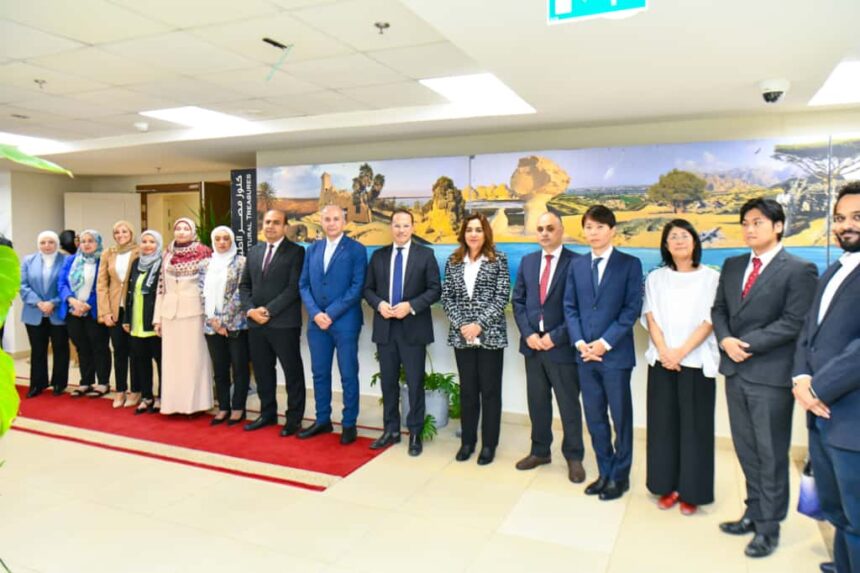What looks like a delay is actually a rethink. Egypt has stretched its flagship circular economy project on single-use plastics to 2027, a move officials say will allow deeper reform, stronger enforcement, and a more sustainable shift away from disposable culture.
The decision to push the project’s timeline from 2026 to 2027 comes from Egypt’s urgent national drive to slash plastic pollution and fast-track sustainable production models.
Plastic waste isn’t just an eyesore; it’s a biodiversity killer and a threat to livelihoods, especially in a country bordered by the plastic-choked Mediterranean and Red Seas.
The extension was greenlit during the project’s second steering committee meeting, chaired by Local Development Minister and Acting Environment Minister Manal Awad.
The gathering included notables such as senior government officials, Japanese Embassy reps, and industry stakeholders.
Funded by a Japanese government grant and executed with the United Nations Industrial Development Organization (UNIDO), this initiative exemplifies “effective development cooperation,” as Awad put it.
Awad spotlighted the project’s role in curbing waste through circular economy principles, including reuse, recycle, and redesign over the linear “make-use-dump” model.
A key focus? Single-use packaging, which consumes resources and litters landscapes. She pushed for new factories churning out plastic alternatives in coastal hotspots like South Sinai and the Red Sea, aiming to slash transport costs and pioneer “plastic-free cities” as national blueprints.
The minister also demanded a rock-solid timeline and budget for future phases, stressing industrial incentives, public awareness, and policy tweaks to mandate a phased switch to alternatives.
This call to action is part of Egypt’s larger climate pledges, which include a national goal to recycle 60% of municipal solid waste by 2027. It is not wishful thinking.
Japan’s embassy rep hailed it as a “presidential project,” emphasizing the Egypt-Japan strategic alliance on global plastic woes.
UNIDO echoed the praise, noting Egypt as one of its top beneficiaries, while the Federation of Egyptian Industries lobbied for scaled-up funding to rope in more factories nationwide.
Milestones Achieved So Far: Building Momentum
Since kicking off, it has picked up wins that lay a solid foundation for circular success:
- New Standards Issued: Five Egyptian standards for alternative plastic bags, ensuring safer, greener swaps.
- Awareness Blitz: The nationwide “Reduce It” campaign, launched in June 2025, is hammering home the message to ditch single-use bags. Backed by Japan and UNIDO, it’s already shifting consumer habits and business practices.
- Lab Upgrades: Assessments of local testing facilities to enforce those shiny new standards.
- Market Deep Dive: A Nile University-led study mapping raw material access and industry readiness for the shift.
- SME Empowerment: Training programmes for small and medium enterprises to adopt circular tech.
- Pilot Recycling: Hands-on initiatives with private firms, testing scalable waste-to-value models.
These steps align with Egypt’s “extended producer responsibility” policy, which holds manufacturers accountable for product lifecycles, a game-changer for plastics.
In tourist-heavy areas like the Red Sea, local bans on single-use items are already proving the concept, blending environmental wins with economic benefits like job creation in recycling.
READ ALSO:
How Tagaddod’s Funding Powers Africa’s Role in Sustainable Aviation Fuel
The Big Bet: Can It Spark a Circular Breakthrough?
On paper, the odds look promising. Extending to 2027 gives breathing room to scale pilots into nationwide norms, potentially slashing single-use plastic consumption by 25% or more by 2030, mirroring global pledges.
Egypt’s petrochemical reliance (plastics make up 36% of its packaging needs) is a hurdle, but opportunities are plentiful: informal recyclers could formalise via tech platforms, creating thousands of green jobs.
Plus, with UNIDO’s global playbook and Japan’s funding muscle, this could model Africa’s first plastic-free urban hubs.
Yet, challenges seem large. Enforcement is tricky in a vast, informal economy; think inadequate compliance in SMEs or smuggling of cheap imports.
Funding gaps could stall factory builds, and without ironclad legislation, industry pushback might water down mandates. Broader headwinds, like water scarcity impacting alternative material production, add complexity.
Still, early signs scream potential. The “Reduce It” campaign’s June launch has already boosted awareness, and the extension signals real commitment.
If Egypt achieves stakeholder buy-in and tech transfer, this could ripple across MENA, turning plastic danger into circular profit. By 2027, we might just see Cairo’s streets and seas a little cleaner.
Understanding the Circular Economy:
The circular economy model promotes sustainable production and consumption by minimising waste and maximising resource use.
Key circular economy principles, often summarised as the 4 principles of circular economy, include designing out waste, keeping materials in use, regenerating natural systems, and encouraging innovation.
Numerous circular economy practise examples can be found in recycling, product reuse, and green manufacturing. Understanding what is circular economy in waste management is crucial, as it focuses on transforming waste into valuable resources.
Organizations and policymakers worldwide are exploring these strategies for long-term circular economy sustainability.
For detailed insights, downloadable resources such as a circular economy PDF or circular economy practices PDF can provide case studies and implementation guides.
The benefits of circular economy include reduced environmental impact, cost savings, and stronger resilience against resource scarcity.
Ronnie Paul is a seasoned writer and analyst with a prolific portfolio of over 1,000 published articles, specialising in fintech, cryptocurrency, and digital finance at Africa Digest News.


